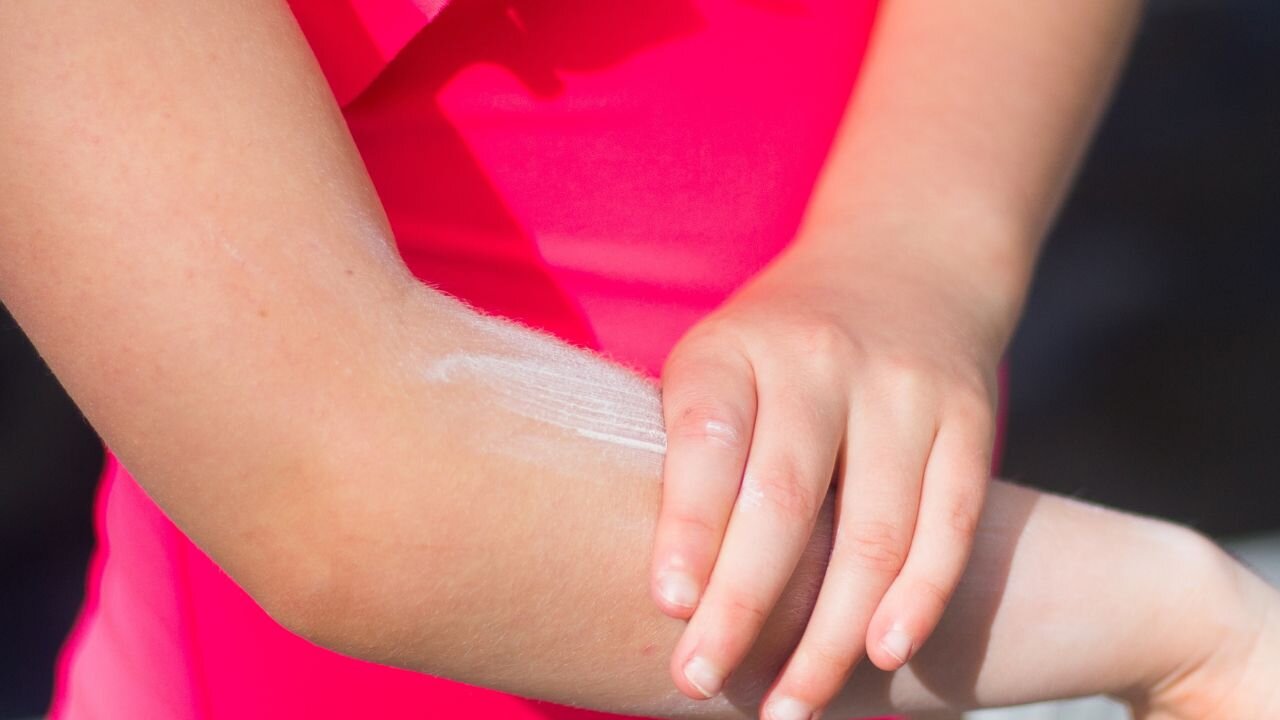Premium Only Content

Americans only wear sunscreen this much
SPF nation? A new survey shows we’re failing at skin protection, unless we’re on vacation.
The poll of 2,000 U.S. adults revealed less than half (41%) wear sunscreen more than 60 days of the year — a majority only wear it for less than a fifth of the entire calendar year. Thirteen percent don’t typically wear sunscreen at all.
Yet seven in 10 claimed having a good suncare routine is important to them.
The source of the discrepancy might be based on whether people are on vacation. Four in 10 take better care of their skin when they're traveling than when they’re at home, and nearly half (48%) said sunscreen is the first product they incorporate into vacation skincare routines.
Commissioned by Melanoma Research Alliance and conducted by Talker Research, the study found why it’s seemingly easier for people to take better care of their skin while on vacation: for 36%, it's more relaxing and they have more time to do it.
For 34%, they're more exposed to the sun on vacation than when they're at home (six hours daily, compared to five, on average).
An additional 26% said it’s simply easier to remember to apply sunscreen on vacation than when they’re at home.
Sunscreen was found to be most often applied to the face (78%), arms (71%) and legs (62%). But areas like the hairline (19%), lips (19%) and eyelids (14%) were least likely to have SPF applied.
And as preferences go, 52% said they prefer a lotion formula for their SPF, opposed to 39% who prefer a spray or aerosol option.
Respondents also like for their SPF formula to be clear (26%) instead of white (12%) or tinted (5%). Only 1% noted they prefer chemical sunscreens, however, users may not realize that is the common term for nonmineral sunscreens.
“No matter if you’re on vacation or at home, it’s equally important to integrate SPF into your daily skincare routine,” said Dr. Marc Hurlbert, CEO of the Melanoma Research Alliance.
“Remembering to wear sunscreen at the beach or while outside on a hot day may be easy, but it’s those tricky, less expected exposures like when traveling in a plane or car, when sitting near a window in your home, or when skiing or snowboarding on trips that people don’t think about. The easiest way to stay sun safe is to wear SPF daily.”
The study also found people tend to use a lower SPF while at home than on vacation. While 55% of people wear at least SPF 30 or higher on vacation, only 44% do the same in their daily lives.
And being a parent has some of its own impacts on suncare routines. Parents were slightly more likely to take better care of their skin while on vacation than at home. And 71% admitted they're more vigilant about applying sunscreen to their kids than to themselves.
Four out of five parents make sure their children understand the importance of protecting their skin from the sun — vacation or not.
Parents polled said they'd trust their kid to correctly apply sunscreen to themselves by age 12, and 71% would trust their kids to put on sunscreen without being reminded to do so.
“As the SPF increases, your relative protection from sunburn increases, too. A sunscreen labeled as SPF 15 will protect your skin from about 93% of UVB rays and SPF 30 blocks about 97%. The higher the SPF, the more protection it offers up to about SPF 50. That’s why we highly recommend that everyone wear SPF 30+ daily,” said Hurlbert.
Survey methodology:
Talker Research surveyed 2,000 general population Americans; the survey was commissioned by Melanoma Research Alliance and administered and conducted online by Talker Research between Apr. 18 and Apr. 24, 2025.
We are sourcing from a non-probability frame and the two main sources we use are:
● Traditional online access panels — where respondents opt-in to take part in online market research for an incentive
● Programmatic — where respondents are online and are given the option to take part in a survey to receive a virtual incentive usually related to the online activity they are engaging in
Those who did not fit the specified sample were terminated from the survey. As the survey is fielded, dynamic online sampling is used, adjusting targeting to achieve the quotas specified as part of the sampling plan.
Regardless of which sources a respondent came from, they were directed to an Online Survey, where the survey was conducted in English; a link to the questionnaire can be shared upon request. Respondents were awarded points for completing the survey. These points have a small cash-equivalent monetary value.
Cells are only reported on for analysis if they have a minimum of 80 respondents, and statistical significance is calculated at the 95% level. Data is not weighted, but quotas and other parameters are put in place to reach the desired sample.
Interviews are excluded from the final analysis if they failed quality-checking measures. This includes:
● Speeders: Respondents who complete the survey in a time that is quicker than one-third of the median length of interview are disqualified as speeders
● Open ends: All verbatim responses (full open-ended questions as well as other please specify options) are checked for inappropriate or irrelevant text
● Bots: Captcha is enabled on surveys, which allows the research team to identify and disqualify bots
● Duplicates: Survey software has “deduping” based on digital fingerprinting, which ensures nobody is allowed to take the survey more than once
It is worth noting that this survey was only available to individuals with internet access, and the results may not be generalizable to those without internet access.
-
 1:12
1:12
SWNS
4 days agoKids’ unapproved online shopping costing families hundreds
11 -
 16:59
16:59
Chris From The 740
17 hours ago $0.18 earnedIs Bigger Better? - The Gideon Optics Mediator 2 Is Here!
7.83K1 -
 7:58
7:58
Blackstone Griddles
14 hours agoTennessee Mountain Burgers on the Blackstone Griddle
13.3K2 -
 43:32
43:32
NAG Daily
15 hours agoThe Rezendes Rundown Ep. 17 - Epstein's Birthday Book
2.66K3 -
 9:28
9:28
Freedom Frontline
19 hours agoEric Schmitt Drops DAMNING Biden Video And The Media PANICS
9.94K6 -
 24:49
24:49
DeVory Darkins
1 day ago $28.95 earnedTrump drops shocking news on Omar as DC Mayor gets humiliated during painful hearing
144K172 -
 LIVE
LIVE
Times Now World
1 day agoLIVE | Lavrov Warns West: Humiliation of Russia Will Have Consequences | Russia | Putin | World News
170 watching -
 55:42
55:42
Coin Stories with Natalie Brunell
1 day agoSaylor vs Wall Street – Why Bitcoin Wins
39.3K8 -
 45:26
45:26
The Why Files
3 days agoCONPLAN 8888: The Secret Plan to Survive the Zombie Apocalypse
39.1K31 -
 10:56
10:56
Liberty Hangout
2 days agoThank You Charlie
196K55